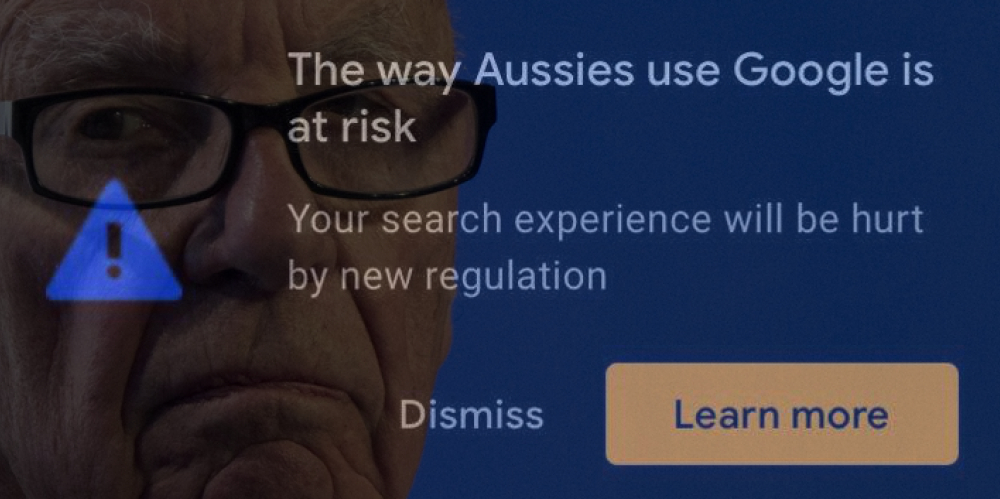Published on the 3rd of September, the full text is available at Arena Online.
The reason that the Australian government is attempting to regulate big tech on their use of news media can be summed up in a single word: Murdoch. Out of all the corporate interests that come together to form the Australian government, one of the most persuasively influential has long been that carried by the necrotic whispers of News Corp. Facing long-term decline in its advertising revenue, Murdoch is teaming up with its competitor/collaborator Nine Entertainment Co. and has succeeded in getting a draft News Media Bargaining Code up and in active consideration.
Essentially, this code seeks to regulate big tech—specifically, Google and Facebook—to share advertising revenue with commercial news-media organisations when publishing their material. Basically, it is about who gets to feed from the flow of advertising money, both the lifeblood of for-profit journalism and a large part of big tech. At present, Google and Facebook account for 71 per cent of the $8.8 billion spent annually on advertising in Australia. Not long ago, this was largely News Corp’s feast, and it has spent the first two decades of the twenty-first century on the back foot. Indeed, it is a sign that things are bad when this steadfast champion of the so-called free market is seeking the assistance of state regulation to shore up its faltering profits.
In Silicon Valley, however, business has never been better. In the last six months of the global pandemic, US-based billionaires, a disproportionally large part of the tech sector, have seen their personal wealth grow by close to a trillion dollars, a 20 per cent increase in their already exorbitant riches. The rapidly rebounding share market is approaching an all-time high, with Google having passed the trillion-dollar line and Facebook fast approaching it.
Meanwhile, back on earth, hundreds of millions of people have lost their jobs, and are threatened by eviction, disease and debt. The International Labor Organization found that almost 2 billion people are seriously struggling to get by day to day. It is not an exaggeration to suggest that we are living through perhaps the greatest transfer of wealth in human history.
In this increasingly catastrophic context, the struggle over the News Media Bargaining Code can be seen for what it is: a minor turf war between factions of monopoly capital. The struggle is high pitched, and deeply corrupt. It is being fought by lobbyists, misinformation campaigns, pop-up warnings, threats, promises and powerful vested interests.
While it is too soon to know how this particular war will play out, the winners and losers are very predictable.
Let’s start with the clear loser: independent public-interest journalism. The government specifically excluded public broadcasters ABC and SBS from the bargaining table, thus pre-empting any attempt by them to access additional funding sources. Likewise, small media organisations were also excluded, leaving them ever struggling for the means to get by.
The code will only strengthen journalism’s dependence on advertising, which critically undermines its ability to serve the public good. Indeed, it further embeds journalism into circuits of cybernetic capitalism and the tech titans’ systems of surveillance and commodification.
Once again, the rules are made to favour the already rich and powerful. Given the crucial role that independent news and critical commentary should play in a functional democracy, it is fair to say that when public-interest journalism loses, the public also loses.
As for the victors, they are clear as well, regardless of how the code fares in practice. To find them, just ask: who owns News Corp, Google and Facebook? According to their NASDAQ listings, the biggest institutional holders of their stocks have significant overlap, with News Corp, Google and Facebook sharing three of their top five largest investors.
Top Five Largest Institutional Holders
| News Corp (NWS) | Alphabet (GOOGL) | Facebook (FB) |
| Independent Franchise Partners LLP | Vanguard Group Inc. | Vanguard Group Inc. |
| SOF LTD | Blackrock Inc. | Blackrock Inc. |
| Blackrock Inc. | FMR LLC | FMR LLC |
| State Street Corp | State Street Corp | Price T Rowe |
| Vanguard Group Inc. | Price T Rowe | State Street Corp. |
This concentrated ownership pattern shows why barracking for either side in this dispute is pointless. No matter whether Murdoch or Google/Facebook wins in this particular scrap, profits will keep being extracted and concentrated in elite hands, surveillance and advertising will keep on manipulating, and news media will continue to serve the interests of the most powerful first and foremost.
That the Australian government is claiming to champion ‘our newspapers’ against foreign interests is rubbish; News Corp is a ‘foreign power’. Again, just look at who owns it, beginning perhaps with its biggest institutional investor, Independent Franchise Partners. This is a company that maximises the profits of US speculators who must make a minimum investment of US$3 million in order to reap the rewards.
The Coalition government (with the likely support of Labor) is choosing a side in this factional struggle largely for ideological reasons—its political project and that of the Murdoch empire overlap so thoroughly. So, once again, Scott Morrison’s government has served up a lose-lose deal for the public that just so happens—whatever the outcome of Treasurer Josh Frydenberg’s scheme—to be a win-win deal for the already rich and powerful.

